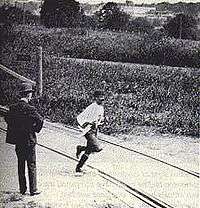Andarín Carvajal
Félix de la Caridad Carvajal y Soto, known as Andarín Carvajal (March 18, 1875 – January 27, 1949) was a Cuban mailman and long-distance runner who competed in the 1904 Summer Olympics.
Andarín Carvajal | |
|---|---|
Carvajal at the 1904 Summer Olympics. | |
| Born | Félix de la Caridad Carvajal y Soto March 18, 1875 San Antonio de los Baños, Cuba |
| Died | January 27, 1949 (aged 73) |
| Occupation | Mailman, long-distance runner |
| Known for | Participating in the 1904 Olympic marathon |

Career
Carvajal was born in San Antonio de los Baños and lived in poverty his entire life before his death in Havana. During his life he was a mailman who performed walking and running exhibitions in Cuba (including a journey across the full length of the island).
Carvajal traveled to the United States to compete in the Olympic marathon at the 1904 Summer Olympics in St. Louis, Missouri, but lost all of his money gambling in New Orleans, Louisiana and was forced to hitchhike and walk the rest of the way. He arrived at the race dressed in street clothes and hastily cut around the legs of his trousers to make them more like shorts. Carvajal performed well in the race despite stopping to chat with spectators and snatching some peaches from a spectator's car. Later in the race he saw an apple tree and stopped to eat some apples which turned out to be rotten.[1] After stopping to nap and recover, Carvajal rallied to finish fourth.[2]
Carvajal returned to St. Louis the following year to run in the inaugural All-Western Marathon, where he finished third, in a time of 3:44.[3]
Carvajal was selected to represent Cuba in the 1906 Olympic Marathon at Athens, Greece, with his expenses funded by the Cuban Government. However, he disappeared after landing in Italy, and never arrived in Athens. He was thought to be dead, and his obituary was published in the Cuban newspapers, but he later returned to Havana on a Spanish steamer. He then turned professional and would go on to defeat American distance runner Henry W. Shelton in a six-hour race in 1907.[4] On May 8, 1909, he participated in a Marathon Derby on a six-laps-per-mile track at the Polo Grounds in New York City with an international field of twelve other professional marathon runners, the most notable being Dorando Pietri. Carvajal was quickly lapped by the leaders after they had completed the first mile in 5:02. The race was won by Henri St. Yves of France in a time of 2:44:05; Carvajal finished, but was never out of last place.[5]
Legacy
The Spanish language book Félix Carvajal, corredor de maratón, by Bernardo José Mora, was written on his life.
A 1956 episode of Telephone Time entitled Felix the Fourth featured Pedro Gonzalez Gonzalez in the title role.
References
- Abbott, Karen. "The 1904 Olympic Marathon May Have Been the Strangest Ever". Smithsonian.com. Retrieved 8 April 2015.
- Martin, David E.; Gynn, Roger W. H. (2000). The Olympic Marathon. Human Kinetics. p. 50. ISBN 9780880119696.
- "St. Louis Boy Wins 25-Mile, Heart-Breaking Marathon Race, Finishing In Burst Of Speed". St. Louis Post Dispatch. May 7, 1905. p. 38.
- Edgren, Robert (April 11, 1907). "Cuban Runner Comes to Life". New York: The Evening World. p. 14.
- ST. YVES ONCE MORE A WINNER - FRENCHMAN EASILY FIRST IN MARATHON RUN - Field of 13 Runners for Professional Race Before 13,000 Persons at the Polo Grounds - Svanberg of Sweden Second - Crook From Fall River Third." The Sun (New York, New York), 9 May 1909, p. 12.
External links
| Wikimedia Commons has media related to Felix Carvajal. |
- List of Cuban athletes
- Profile (in Spanish)